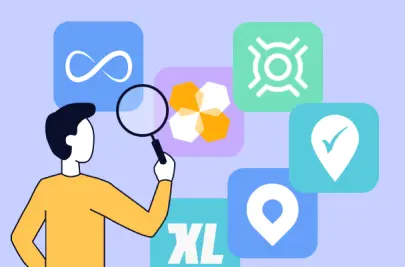
- Dispatch software makes it easier to manage vehicles, people, and resources, enhancing efficiency and profitability.
- Key features of dispatch software include scheduling, communications, route planning and optimization, and real-time vehicle tracking, often employing technology like dashcams and GPS.
- This article focuses on dispatch software for last-mile delivery and field services, tailored for small to medium-sized businesses (SMBs) which need affordable, scalable, and user-friendly solutions.
- For last-mile delivery and fleet management the standout choices are Routific, Onfleet, Route4Me, and Motive.
- For field service dispatch software, the top picks are Mobiwork, Housecall Pro, and Optimoroute.
"Dispatch" is about getting vehicles, people, and resources to the places they need to be to complete tasks. Organizations that have dispatch operations include:
- Emergency services like ambulances, police, and firefighters.
- Taxi services
- Field service and maintenance companies like landscapers and pool services, plumbers, electricians, etc.
- Utilities that send out field technicians
- Trucking and last mile delivery companies
Each of these has very different needs and priorities. For example, speed is the priority when you’re dispatching an ambulance. But if you’re dispatching a truck to make a round of deliveries, it’s more important to make accurate ETA predictions, and to plan the most efficient route.
Successful dispatch operations depend on getting the right people and materials to the right place, at the right time and as efficiently as possible. Dispatch software solutions tend to include some combination of:
- Scheduling
- Communications
- Route planning and optimization
- Real-time vehicle and asset tracking (often using dashcams, GPS trackers, or other sensors)
In this article we’ll focus specifically on dispatch software for last mile deliveries and field services. (Emergency services dispatch is highly specialized and not something we’re experts in, so it’s not included).
We also focus on small- to medium-sized businesses, with a couple of hundred employees or less, because SMBs have very different software needs compared to enterprises. With tight budgets and tiny IT teams, SMBs need affordable, user-friendly, and web-based dispatch systems that don’t need extensive implementation or customization. The software also needs to integrate easily with other systems like Quickbooks, and to be scalable so they can grow with the business.
Given their tight budgets and small IT teams, we’ll look at dispatch software for trucking, courier and delivery businesses first, then discuss field service management software. If you’re not convinced you need software in your dispatch operations at all, we’ve also added a section at the end about the benefits.
Dispatch software for trucking companies, couriers and delivery businesses

Trucking businesses, couriers and delivery services are all about moving physical goods from place to place. This often involves complex routing. In addition, dispatchers often need to work with different vehicle types: for example, fresh food and beverage deliveries may need refrigerated trucks. Any dispatch solution that can simplify this complex process will improve operational efficiency — and the company bottom line.
The essential features of delivery and trucking dispatch software include:
- Route planning and optimization
- Real-time GPS tracking
- Customer communication and messaging
- Proof of delivery
- Integration with inventory or warehouse management systems
Here’s our pick of dispatch systems for last-mile delivery and transport companies:
Routific: Best for medium-sized local delivery businesses

Route optimization for last-mile delivery businesses and couriers is Routific’s main strength. The app is noted for being easy to use and for offering great customer support. It’s also powerful enough to scale with a growing business, handling anything from a single route to 50,000 stops per day and beyond. Larger businesses who want to develop their own platforms can use our route optimization API.
The combined map and timeline view gives dispatchers an overview of all their routes, and the ability to edit routes when needed. Routes are updated in real time as drivers complete their stops, so it’s easy to track progress through the day. Customer notifications are sent automatically and can easily be customized.
Routific is best for small to medium-sized businesses who don’t deliver on-demand, and can plan their routes in advance.
We don’t offer barcode scanning, real-time chat inside our app or label printing, so if those are important to you, Routific might not suit your needs.
The full-featured version of Routific is free to try for 7 days — no credit card or phone number needed.
Pricing: Routific’s freemium pricing model is based on the number of orders scheduled, rather than the number of drivers or routes.
- The first 100 stops every month are free, to accommodate the needs of very small businesses, non-profits, and occasional users.
- 100-1,500 orders: $150 a month.
- Above 1,500 orders we charge a few cents per order. Pricing starts at 15c a stop up to 2,000 orders a month, going down to 3c a stop for more than 20,000 orders a month.
Rating: 4.9 (120+ reviews)
Onfleet: Best for on-demand delivery and couriers
Onfleet calls itself a “complete toolkit for last mile delivery”. Its major strength is its auto-assign feature for on-demand deliveries, which enables fast turnaround times and customer self-service. Dispatchers and drivers also like the live chat option inside the driver app.
On the downside, Onfleet is much more difficult to use than other dispatch and scheduling software, and some users report it can be slow or buggy.
Overall it has a fuller feature set, including barcode scanning, than Routific or other rivals. That’s reflected in a much higher price, which might put it outside the budget of smaller companies.
Pricing: Starts at $550 per month with a limit of 2,000 pickup/delivery tasks. Barcode scanning, age verification and 5,000 pickup/delivery tasks start at $1,265 per month. Custom pricing is available for enterprise customers.
Onfleet does offer a 14-day free trial, but you will need to give your phone number and credit card details.
Rating: 4.7 (90+ reviews)
Route4Me: Best if you need maximum flexibility and don’t mind paying for it
Route4Me is one of the original route planning and route optimization tools, with a well-developed marketplace of optional mix and match modules for maximum flexibility. This makes it very flexible for different needs, but some of the add-ons are expensive.
- Curbside pickup ($499 per month)
- Commercial vehicle routing ($19 per user per month)
- Allocating stops to time windows
- Field services and field sales management ($99 per month)
Route4Me also charges extra for premium customer support, and for some route optimization features like driver breaks and recurring routes. Other dispatch solutions like Routific offer these as standard.
Motive: Best for fleet and asset tracking
Motive is both a hardware and a software company. Originally known as KeepTruckin (the name changed in 2022), it makes a range of devices to automate vehicle and equipment tracking, driver safety, compliance, maintenance and spend management.
Its devices include dashcams, a fleet card for spend management, and electronic logging devices (ELDs) for recording hours of service (HOS). ELDs are mandatory in the United States and Canada, so Motive has a large captive market that has enabled it to grow fast, and add lots of new functionality.
If your core business involves managing a trucking fleet doing lots of point-to-point journeys, Motive may be a good option for you.
It’s not clear, though, how good Motive is at multi-stop routing and route optimization, which are essential if you’re doing last mile deliveries.
Because it has a large and complex product range, it’s also hard to get information about Motive’s pricing. On the Capterra review site, though, it rates only 4.2 stars in the “Value for Money” category.
Rating: 4.5 stars (1,600+ reviews)
Also-rans
There are a bunch of dispatch software systems that come up in searches but that we haven’t reviewed in detail, for various reasons. They include:
Axon Trucking Software
This is fundamentally an accounting package specialized for trucking companies and fleet operations, rather than dispatch software. Its users do seem to rate it highly, but it lacks features like route optimization and proof of delivery.
ITS Dispatch from Truckstop
Truckstop is primarily a load board, an online marketplace where carriers, shippers and freight brokers can connect. Truckers can find loads to haul, and shippers can find drivers to haul their freight. It’s also a platform where you can build a brokerage business. The overall service is highly rated, but the actual dispatch software doesn’t operate independently from the load board. Its main purpose seems to be helping with back-office management and paperwork invoicing, settlements, payroll, and reporting. It’s also great for users in North America who need to handle IFTA (International Fuel Tax Agreement) paperwork, but it’s not a dispatch management system.
ProTransport
ProTransport is another transportation management app that has some great features like a live dispatch board with real-time updates, but it lacks in other important areas. It has GPS tracking and two-way driver communication, but no route optimization, customer notifications, or proof of delivery.
Samsara
Samsara is primarily fleet management and fleet security software. Its dispatch features are described as “very lacking”. They’ve also been sued by Motive, so things could get messy.
TruckLogics
This app only has 3.6 stars on Capterra. With such a poor overall rating from existing users, this is probably not a TMS worth trying.
TruckingOffice
TruckingOffice is trucking management software aimed squarely at smaller businesses. It offers a simple load planning and dispatch system, integrated with an ELD app. It doesn’t offer any route optimization, though.
Field service dispatch software

Field service businesses, like HVAC, plumbing, or electrical service providers, typically need dispatch software that can manage and schedule a team of technicians in the field. Dispatchers need to ensure that the right people, with the right skills and tools, arrive at the job site on time — and equipped with accurate customer information to do a good job.
Essential features include:
- Work order management
- Customer information management
- Mobile access for technicians
Mobiwork: Best all-in-one solution for businesses with mobile workforces
Mobiwork takes a different approach from other software companies in this space, offering preconfigured solutions tailored to the specific needs of different business types. For example, they have separate solutions for pool and spa services, locksmiths, HVAC, cleaning and so on.
The software covers a lot more than dispatch, including everything from estimates, work orders, and scheduling to invoicing and document management.
Mobiwork gets a lot of rave reviews from its users, with an unusually high 4.9 star rating on Capterra. Reading the reviews, even the most negative comments are about relatively minor issues, and these users still rate the software highly overall.
Their pricing isn’t disclosed on their website, but Capterra information says it starts at $20 per month — and there is a free trial available.
Rating: 4.9 stars (100+ reviews)
Housecall Pro: Best for home services
This is dispatch software that also does everything else a field service company needs, from estimates and job schedules to invoicing. They specialize in home services like plumbing, electrical, carpet cleaning, HVAC, housekeeping, handyman services, window cleaning, locksmiths, and more.
It has a very impressive user rating and rave reviews. It’s accessible either as a cloud-based web app or on a mobile device, and reviewers praise its ease of use for both field technicians and customers. They also like the customizable text notifications, which help to create a professional customer experience without the need for anybody to make a phone call.
On the downside, some users note that Housecall Pro lacks some advanced features. On the whole, however, it seems to be an excellent, affordable business management solution for home service companies.
Pricing: Starts at $49 per month.
Rating: 4.7 stars from 2,500+ reviews
OptimoRoute: Best for route planning and dispatch combined
OptimoRoute takes some time to learn, but it’s a powerful dispatch app with a lot of flexibility and control for you to set up your routes exactly as you wish.
You can set up individual driver profiles with their own shift schedules (including breaks and overtime), start/end locations, skills, vehicle types, service areas you want them to stay in, and even cost and speed settings. You can also set up multiple capacity constraints (e.g. weight & volume).
We couldn’t test as thoroughly as we would have liked, because Onfleet limits free trials to 250 stops. Given that limitation, the route optimization was fast — but there was lots of overlap between routes, and it was difficult to edit the routes.
Pricing: If you sign up for a full year, pricing starts at $35 per vehicle per month with a limit of 700 orders, or $44 per month for up to 1,000 orders, real-time tracking and proof of delivery. Custom pricing for more complex needs is also available.
Rating: 4.6 (150+ reviews)
Also-rans
Jobber
Another all-in-one accounting, sales and management app for home service businesses, with a strong mobile app on both Android and iOS.
Pricing: The “Lite” tier starts at $9. For $49 a month you get job scheduling and online request form. Online booking and a Quickbooks integration are available starting at $129 a month.
Rating: 4.5 (700+ reviews)
mHelpDesk
Offers a similar range of services to Housecall Pro, targeted to small home service businesses. It’s not rated as highly by its users though.
Pricing: Not disclosed — you have to contact them for a demo and quote.
Rating: 4.3 (800+ reviews)
The benefits of dispatch management software
Less time spent planning
With a good dispatch management solution, a small team or individual can schedule dozens of service or delivery routes in minutes.
More efficient routing
Route optimization means the same number of field service workers or delivery drivers can complete more stops in less time.
Increased driver satisfaction
Shorter working days, with less time on the road, make for improved working conditions and much better safety. Mobile apps can also help to streamline the delivery process and service operations, making it easier for drivers and dispatchers alike to adapt to last-minute changes. With driver empowerment identified as a key trend, anything that improves life for drivers gives a competitive advantage.
Better customer satisfaction
More accurate ETAs and time windows, along with automated notifications, help customers plan their days without disruption. In the case of deliveries, customers also love faster delivery time and features like photo proof of delivery.
Lower costs
Less time on the road translates to lower fuel costs and less driver overtime. It also means less wear and tear on vehicles and lower fleet maintenance costs.
More sustainable operations
Route optimization is good for the planet as well as profitability! Less gas use translates to lower CO2 and other greenhouse gas emissions from burning fuel.
To sum up, in 2025 any business that’s making field service calls or deliveries should be using dispatch software. At Routific, we think of it as being like putting on an Iron Man suit, adding all the benefits of automation and AI-powered route optimization to the dispatcher’s toolkit. It makes life easier, lowers costs, increases profitability, and lowers your carbon footprint into the bargain. What’s not to love? If you want to test the benefits for yourself, Routific is free to try for 7 days — no credit card needed!
Frequently Asked Questions
Related articles
Liked this article? See below for more recommended reading!

Optimizing Operations: A Complete Guide to Dispatch Management in 2024



